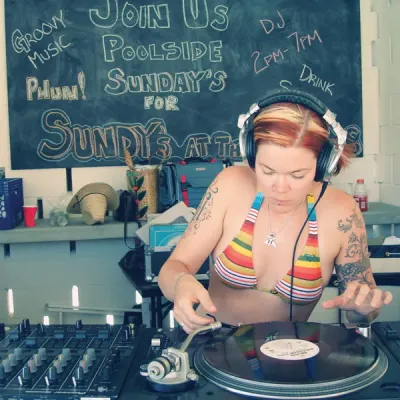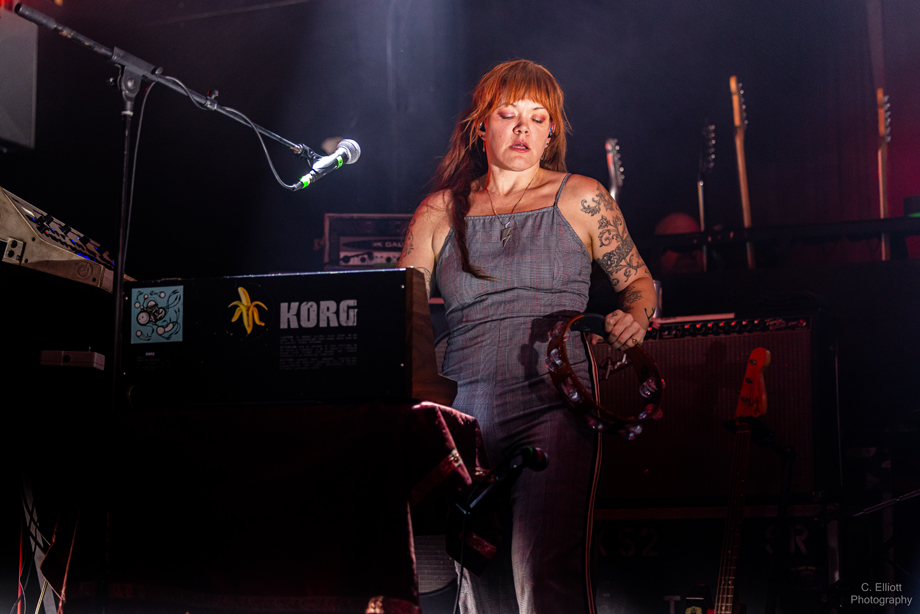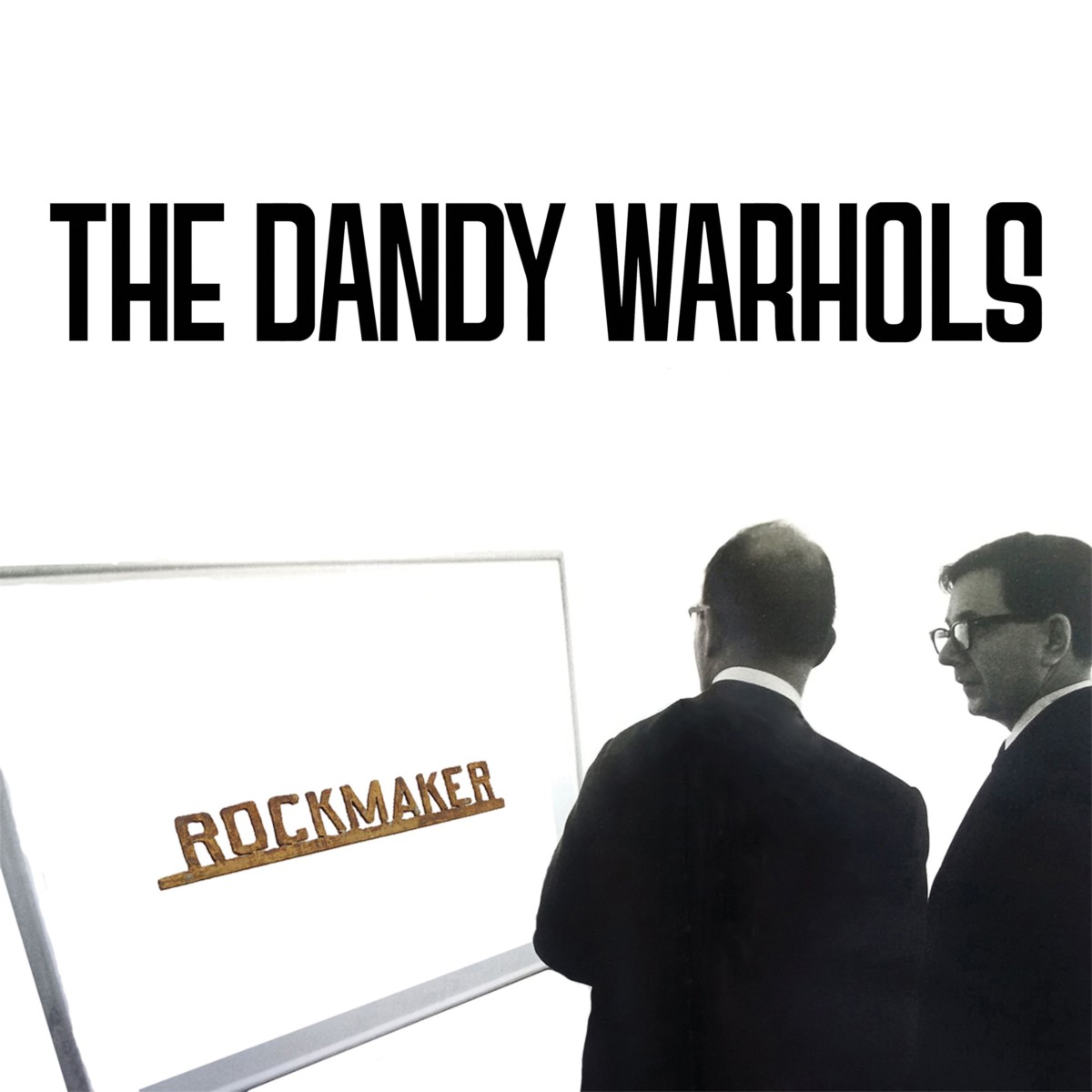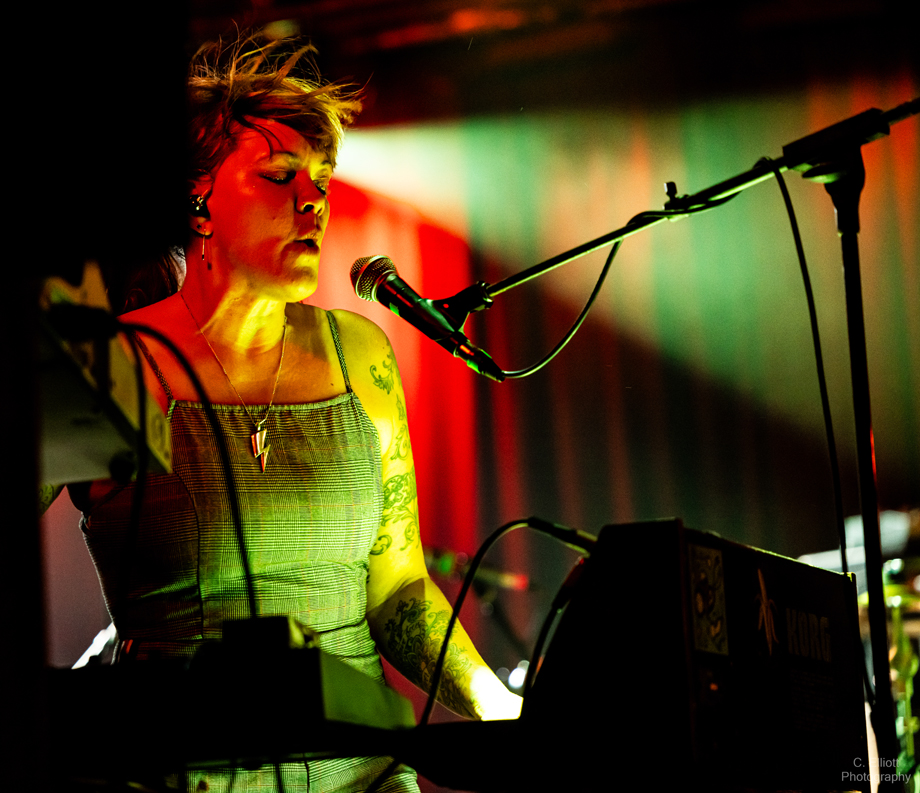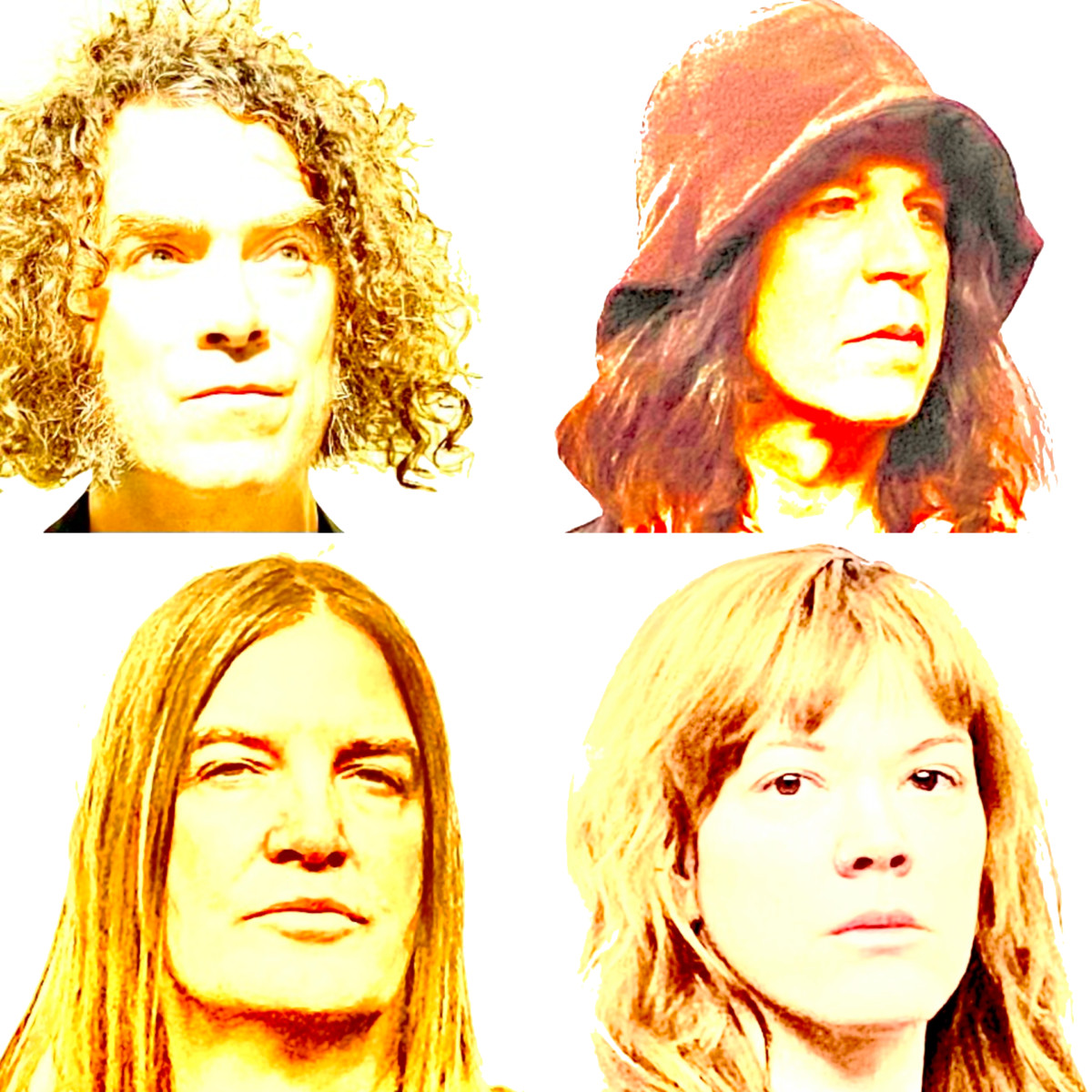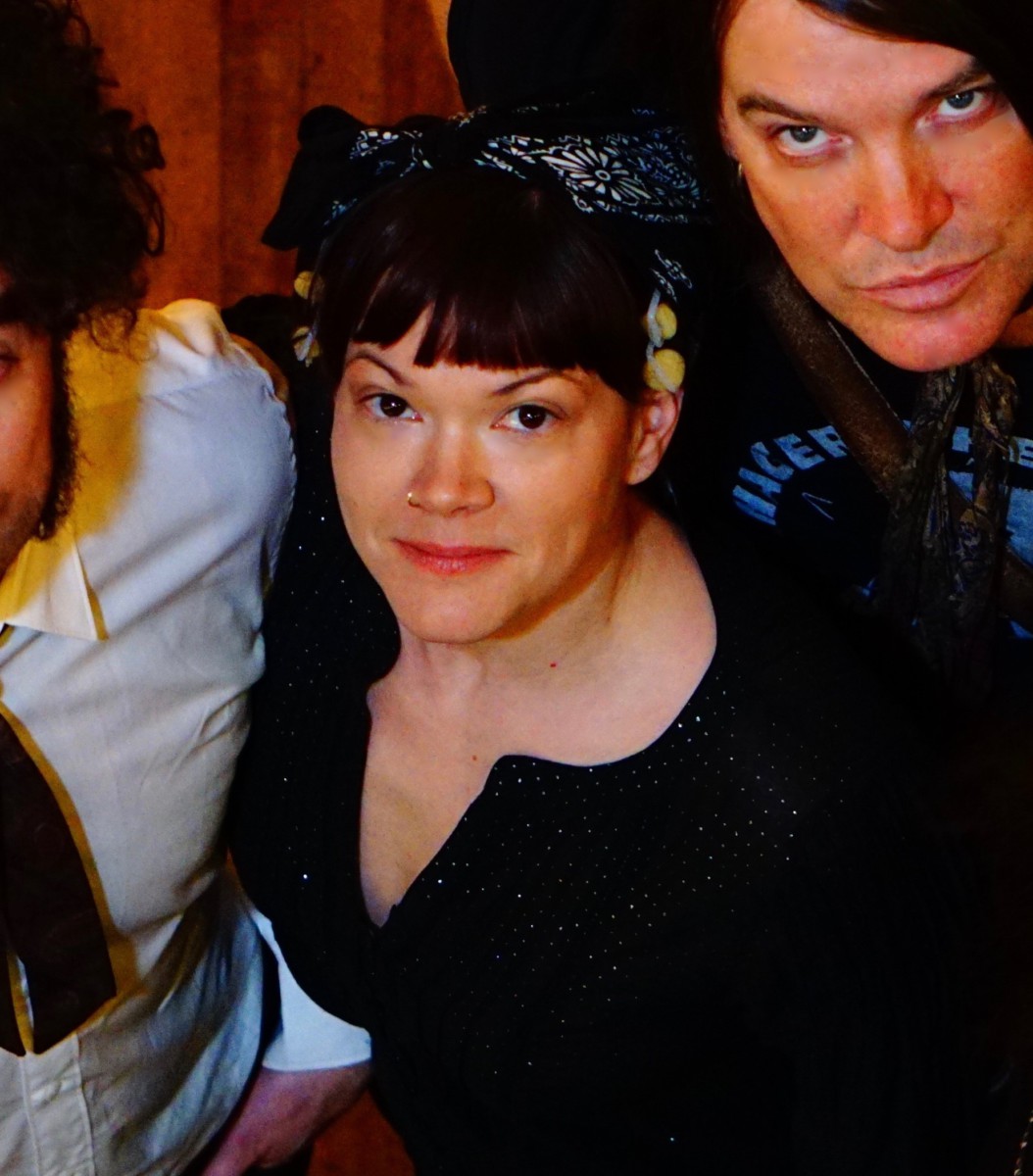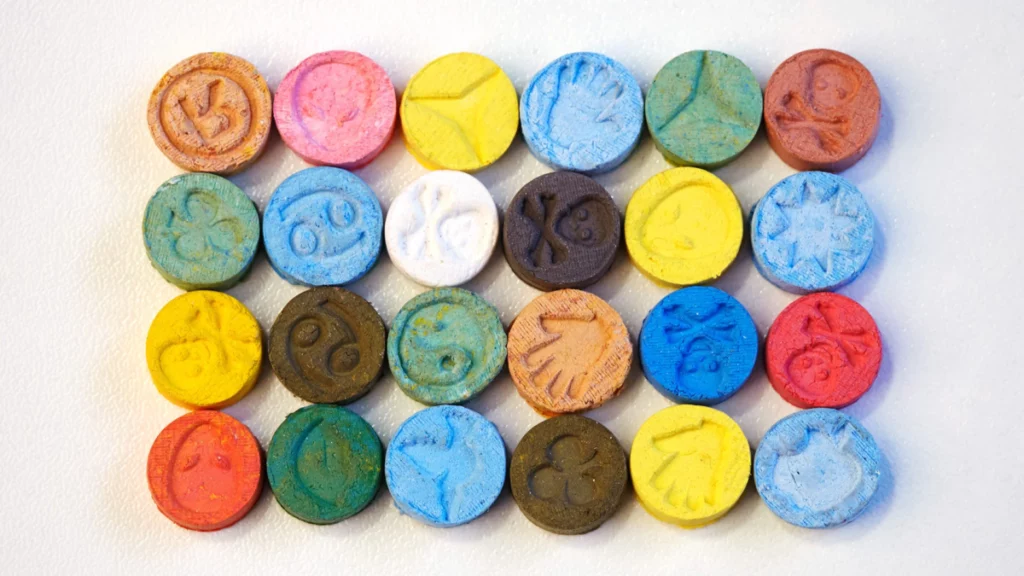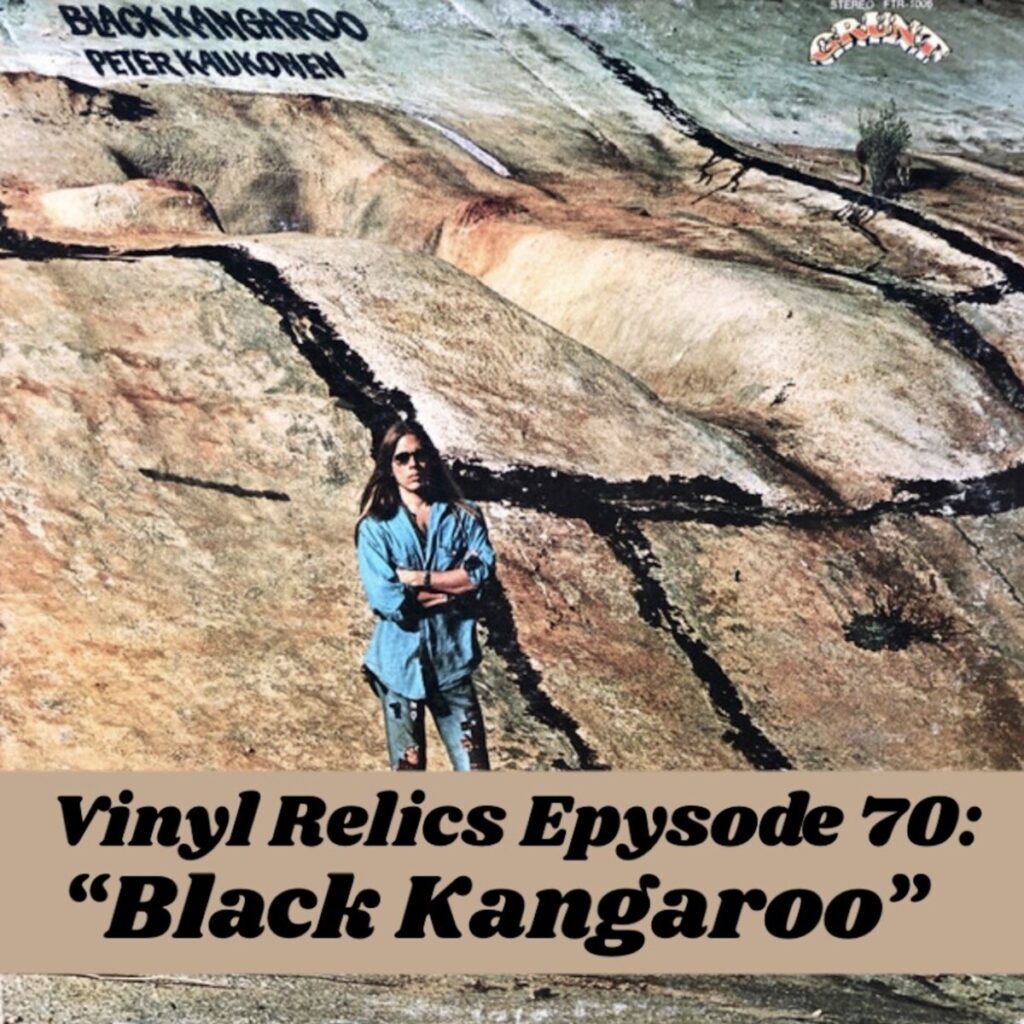Interview: Zia McCabe of The Dandy Warhols
Interview: Zia McCabe of The Dandy Warhols
LeValley:
This is Jason LeValley with Psychedelic Scene and I’m here with Zia McCabe of the Dandy Warhols, who have a new album coming out called Rockmaker. Thanks for being here, Zia.
McCabe:
Yeah, thanks for having me.
LeValley:
You were pretty young when you joined the Dandy Warhols. How much musical experience did you have prior to that?
McCabe:
Basically none. I took a beginning guitar class in college and that was it. My background was dance and welding, actually.
LeValley:
Okay. Did the band already exist in some capacity when you joined?
McCabe:
Yeah, they’d been around for like six months. A woman that Courtney was dating, Gretchen, who (inaudible, possibly “Not If You Were the Last Junkie on Earth”) is about. She was playing and it just wasn’t going super well. The relationship and the band relationship. And so when she was out, Courtney tried out a few bass guitar players, and he just didn’t really like the direction that a lot of the local musicians were going in. The way he described it was they had a lot of bad habits. And so he was lamenting to this guy, saying, just another cool chick would be great that will play synths. She doesn’t even have to know how to play an instrument. And he knew me, and he knew that I had put it out there that I thought being in a band sounded pretty cool. That was it.
I like dreamy, trippy music with a lot of melody.
LeValley:
All right.
McCabe:
The rest, just bravely showing up to something you don’t know how to do.
LeValley:
I read somewhere that you didn’t like grunge as you were emerging as a musician in the early nineties. Is that true?
McCabe:
Yeah. I was super disappointed in the trends of music when I should have been loving the music of my age. I was still very much in the creeping into the 80s, but I just wasn’t that into the. Appreciate some of it now that it’s distant and it’s not being force fed to me. But no, I like dreamy, trippy music with a lot of melody. And grunge is kind of like pretty severely lacking in melody most time, and way overplaying angst. And yeah, I just didn’t relate to it.
LeValley:
So how has your musical taste evolved over the years, and what genre do you find yourself drawn to mostly now?
McCabe:
Well, I discovered library music, and so I’ve been getting very much into library music. I am leaning much more heavily. It’s always psychedelic. Everything to me typically has some sort of psychedelic aspect, but I’ve branched out into sort of all the continents of the world and seeing how they interpret psychedelic music, how they interpret jazz and ambient, I seem to be more pleased with music that’s either not in my language or has no lyrics or vocals at all. And, yeah, I’m actually starting a radio program called Get Lost. That is going to be all the trippy soundtrack, Sci-Fi library, avant garde ambient music from my collection.
Photo courtesy of Zia McCabe
LeValley:
Oh, cool. That’s going to be a radio show?
McCabe:
Yeah, Shady Pines is the radio station. I think the first one is going to be on Easter Sunday on the 31st of March.
LeValley:
Okay. Is that an Internet station?
McCabe:
Yeah, they started in Covid. It’s a local station in Portland that they just really wanted to show everyone how easy it was to have a radio program from your own home. And so that’s the way the collective came together. And they still don’t have an actual station. Everybody broadcast from their house.
LeValley:
All right, on. Okay.
McCabe:
Yeah.
LeValley:
You mentioned psychedelics, and I wondered how much of an influence psychedelics have had on the Dandy Warhols. Psychedelic substances.
McCabe:
Psychedelic substances. I mean, it doesn’t take much, right? Like, once you kind of break the seal on psychedelics, you sort of get the idea. And so I wouldn’t say that any of us have ever been like, heavy psychedelic drug users, but we very much value the experience when the timing is right. We’ve had a few where we’re all together and have tripped down in Joshua Tree in the desert or something gets offered at that festival.
Once you kind of break the seal on psychedelics, you sort of get the idea.
We’ve had enough to bond us that way. But I don’t know, none of us are really heavy users of anything. I’m sure alcohol plays a big role in our lives over the years, but it certainly influenced us. One trip goes a long way. Psychedelics.
LeValley:
All right, I know you DJ sometimes. What’s that?
McCabe:
Oh, I was just saying we’re definitely pro psychedelics.
LeValley:
Awesome. So I know you DJ sometimes under the name DJ Rescue. What kind of stuff do you spin?
McCabe:
Well, it massively depends. I oftentimes am expected to do kind of indie and sort of stick with the genres that we fit into. That’s what people are expecting. And so I play a lot of our influences, and you’ll hear a lot Bowie and Velvet underground and a lot of the usual suspects. But I could do a Chinese New Year’s and have it be all asian influenced, or I could do a cool hotel restaurant and play all the psychedelic cumbias. And my favorite music from Kenya in the could do a 90s hip hop night. I love doing soul nights. I can do 80s forever. What I don’t do is EDM. I’m not a fan of that kind of music. I never have been. It reads as quite soulless to me, and I don’t do like, real heavy metal, really hard. But what I call boy music, it’s just aggressive and it hurts my head and I’m not interested. Everything else is pretty much game top 40. Not so much.
C. Elliott
LeValley:
Yeah. Well, beyond the realm of music, what other art forms, literature or experience inspires your creative process?
McCabe:
Oh, my God, all of it. I mean, we’re all big readers, obviously less in the digital era. The attention span has sort of corrupted our abilities to pay attention to the written page. But we are all very much into Sci-Fi and have been passing Sci-Fi books around for 30 years. We all reread the Vonnegut novels from time to time, and the Bradburys and the Heinlens and of course, film– art film. We all sat around and watched Fellini films in the never stopped being interested in art. I think. Poor Things is probably the coolest movie I’ve ever seen, and it just came out. So art films are still happening and hitting the mainstream, which is spectacular. Food. We are highly motivated by food. Not Peter. Peter’s not motivated by food at all. Food for him is this irritating necessity of being alive. But the rest of us have a lot of passion for what we eat. And then just lighting is huge for us. We’re comfort seekers and hedonists, and we want to get the most out of the least effort, and we want it to be lit well and sound good and feel good to the touch and be placed in an environment that makes us look and feel sexy and look and feel smart.
LeValley:
Okay. What’s your proudest moment as a musician?
McCabe:
David Bowie. Meltdown Fest was really cool to have Bowie curate. It’s kind of an art intellectual festival in London where they take turns curating. Brian Eno was there. He fell asleep during our opening set, and I was very flattered. I had fallen asleep to Eno many, many times, hundreds if not thousands, so glad that I was able to return the favor just once. I was not offended at all. I mean it’s hard to beat being offered to be part of Bowie’s meltdown lineup and play “White Light White Heat” on stage with him. The only other act to share at the stage in that manner was Velvet Underground doing “White Light White Heat”.
LeValley:
Wow, that’s pretty cool.
I watched the riot girl movement, the feminist movements, have all this, ‘Oh, it’s because I’m a girl’ and have this guard up and be watching to be slighted.
McCabe:
How do you beat? Yeah.
LeValley:
Right?
McCabe:
Yeah. And we’ve had other great ones. Opening for the Stones was great. Opening for Tom Petty was great. Playing some of the famous festivals around the world. Just making it for 30 years is pretty prideful.
LeValley:
Yeah. Have there ever been any challenges with you being the only woman in a group with all guys?
McCabe:
I guess sort of the way looking back on it, my approach was to just disregard that as even a thing and to never be looking. I watched the riot girl movement, the feminist movements, have all this, ‘Oh, it’s because I’m a girl’ and have this guard up and be watching to be slighted. And I thought, what if I just didn’t even acknowledge that that existed? How much could I dissipate by not shining a light on it? Just never even give it any space, which I think worked quite well until it doesn’t, right? Until there really, truly is some misogyny happening and some sexism happening. And then I’m just utterly confused about why because I forgot to allow this as a reason. It happened in the studio one time, I was talking to Peter. I’m like, ‘I don’t understand why this engineer doesn’t seem to be taking any of my ideas seriously’. And he’s like, ‘are you kidding? Because you’re a girl’. I was like, ‘what would that have to do with it? That is so absurd. You can’t tell I’m a girl when you hear the part’. And that just really, I had to admit, okay, that is still happening, and I probably am still suffering in subtle ways, but I really just have done my best to not let that get to me or slow me down or keep me up at just.
McCabe:
I think I kind of over-corrected and went very masculine in my behavior, what I call kind of a Hillary Clinton, where you just sort of, if you can’t beat them, join them. And that was a great way to survive when I was younger and didn’t have some of the skills that I have now. So now I’m able to feel pretty solid in my femininity and own it and wield its power rather than deny it. And so things have shifted over the years, as has the feminist movement, and as toxic masculinity starts to get recognized as something that hurts all humans, not just women. Right. This stuff is shifting, and it’s been fun to be kind of on that ride throughout.
LeValley:
Sure. The updated version of Dig! is about to be released, I think. Have you seen it?
McCabe:
Yep.
LeValley:
Do you feel like it portrays you accurately and the rest of the band?
McCabe:
No, not really. I mean, somewhat. I went out to the Sundance Film Festival to perform with our original drummer and a couple of people repping Brian Jonestown, and I wanted to be a diplomat. I wanted to have a say. I wanted to see it in case I could make some adjustments before it got released and it was a beautiful, beautiful trip with lots of reminiscing and a lot of nostalgia and a lot of, like, oh, same old bullshit. Cool. I do still feel that that film did more good than harm. That is not a consensus in my band whatsoever, but I’m a little more engaged with our audience and I can see that it’s done more good than harm. Right. And it does hurt our feelings to be seen in a way that we don’t feel represents us. But you can’t make all the people happy, especially when you’re not the one telling the story. We don’t have agency over this story, even though it’s us. And that was a really hard lesson to learn. And it can be really cringey to tolerate having something so big out there not tell the story you thought you were telling, which was how awesome it is to make music together and have two artists sharing two bands sharing their ideas and feeding off each other.
McCabe:
Instead, it showed that we were feeding off our anger and our lack of sleep and our rough family backgrounds or substance problems, depending on which band we’re talking about. It’s just hard to be reduced to the drama and not the beauty and the creativity. It’s just a little hard to watch that. And, yeah, they added a lot of footage, and some of it gives more context, and some of it’s just more of the same. And so I did plead that they really, like, this is your chance to give a little more here. And I don’t know if adding 40 minutes more, where 30 of the 40 is still more drama, helps that. I don’t think it made it better. It’s made it longer. We’ll see how it’s now been screened at Sundance. They now have an opportunity to go back and do some final revisions. I’ve given them my $0.02. We’ll see what happens. But it still remains completely incredible that a film was made about two nobody bands who happen to still be making music. What are the odds? The percentage of bands that make it this far is crazy. I mean, nobody’s died.
McCabe:
Yeah. And to still be the story, to still have a story to tell, that alone just makes it a win, because they won the lottery on who they chose to follow around in that respect.
C. Elliott
LeValley:
Yeah, no doubt. I read somewhere that you take a nude photo every year on your birthday.
McCabe:
Yeah. And sometimes bonus ones throughout the year. But yes, I do. I think it’s a great way to show body positivity. And some years I don’t feel my best, right? I don’t feel like I have a good figure and I do what I can to keep it that way. But sometimes you haven’t worked out in six months or a year and you feel pretty flabby, or you’re going through some hormonal changes in midlife and you’re feeling pretty flabby, and there’s just all kinds of ways to feel flabby. It’s much harder to feel fit and self confident. And I want to prove to myself that I can love my body, even, and put it out there and celebrate it even when it’s not my favorite. Because if you wait for life to be perfect, you’re going to miss out on so much. And it’s a way to remind myself that you can love yourself and be beautiful and not be perfect. Rarely you’re perfect, so don’t wait for perfection. It’s kind of the point of my birthday suit photos, and I’m a bit of a nude. I just prefer to be naked, so I might as well capitalize on it.
LeValley:
Not to sound creepy or anything, but do you ever plan on putting those on display?
McCabe:
They’re all on the Internet. Oh, yeah, they’re in my Instagram feed. They’re all there.
LeValley:
Oh, wow. I didn’t realize that.
McCabe:
Okay, roll away. They’re all there.
LeValley:
Okay, so you’re a licensed realtor, which seems kind of weird. What made you decide to do that?
McCabe:
You know what? It’s not. Well, hold on. It’s not weird if you think about it, though, because it took me four years of thinking of going, okay, we’ve got a career arc here that statistically isn’t going to last much longer than this was ten years ago. So it is still going, but you can’t count on it. And I have people who count on me, my mom and my daughter. And I got a lot of plates spinning. And I was starting to really feel this mounting pressure of, how am I going to make sure I can take care of these people and myself? And I was like, well, you went to one year of college and studied welding and nutrition. Don’t really know how to use computers in a way that you could enter, like, the tech world, and we don’t make a ton of money, but enough that you can’t just go to the grocery store and be a checkout person and make the same amount. So I was like, well, you can be a stripper or a bartender or a realtor. I mean, there just isn’t much out there where I didn’t have to go back to school.
McCabe:
I wanted to keep being a musician. If I was completely pivoting, then there’s lots of choices. And so it took a few years before I was like, okay, I think it’s time to really take this seriously. Nothing else had come up on the list. And I’m good at math, and I’m good at people, and I love my city, and I own a 100 year, 115 year old home since I was 24. So I have all the things that you need to be a realtor. And I thought, well, even if you hate it, you will be good at it. So just go be good at it for a while and see what it leads to. And I can do it on the road. Right? I have a deal going right now, a really difficult one. I’m not thrilled about it, but I can. And I have every tour bolt one since I got my license six years ago. And it’s become a niche for me that I get lots and lots of artists and musicians into houses that didn’t even. Something I realize is musicians and artists are conditioned to not believe in themselves. As productive members of society, we are conditioned to not believe that we even deserve to own property.
Photo courtesy of The Dandy Warhols
McCabe:
And I didn’t quite realize that was so systemic. And so if it takes me three years to coach someone through getting their credit up and maybe confronting some student loan debt and just believing in themselves, and then they own a home at the end of that, I don’t think that’s the business model for every realtor. So I found kind of a great spot for myself.
LeValley:
Okay, so the new album Rockmaker is due out, I think, March 15th. How does it differ from other Dandy Warhol albums, or does it?
McCabe:
I feel like every one of our albums differs wildly from the one before and then also doesn’t? Right? Because it’s still us, it’s still our radial equipment, and it’s still our studio. So we definitely have a sound, and we go in with different ideas for each record and how close we adhere to that throughout the process is different per album. But the boys really just wanted to make a nuanced, sophisticated hard rock album, because a lot of hard rock is sort of kind of knuckle-dragger. It’s the lowest common denominator. No offense to people who love hard rock, but that can be a generalization of that genre, and they really like it, but wanted to elevate sort of the intellectual aspect and some of the innovations of sounds and bring some of our trippy, psychedelic stuff into it. It’s not the most me album that we’ve ever made, but I really appreciate it. I went heavy on percussion for this album more than any other. I mean, I played rainsticks and chimes and triangles and gongs and whatever I could get my hands on, and that was a kind of a fun experiment for me.
McCabe:
Not that I haven’t always done percussion, but I really leaned into it, this record. So, yeah, I think it’s different in that regard. It doesn’t have the dreamy, trippy ones that some of our albums focus on.
LeValley:
Okay.
McCabe:
And, of course, all the guest musicians. That’s amazing.
LeValley:
I’m sorry, all the what musicians?
McCabe:
All the guest musicians.
LeValley:
Oh, right. Slash, right, Frank Black.
McCabe:
Yeah.
LeValley:
Who else is on that?
McCabe:
Well, there’s one more that we’re supposed to not say yet. I don’t know why. I think most people know, but I’m not going to be the one that gets in trouble for saying it.
Mike Morgan
LeValley:
Okay. Did you actually work with those musicians in the studio?
McCabe:
No. I mean, that’s the thing. In the old days, to get somebody was a huge deal because you had to go to the studio. So, like, Duran Duran, we worked with them in the studio. But these guys. No, you just send files back and forth and they send you back their stuff and you edit it to the way that works for your intentions, and then that’s that.
LeValley:
But you’ve met Slash. I think. I think I remember seeing a picture of you with him.
McCabe:
Yeah. Pregnant.
LeValley:
Yeah.
McCabe:
I asked if he would take a picture, so Guns n’ Roses was the first two records I ever bought with my own money. So seeing Slash at that festival was really exciting, and he was, of course, totally sweet and cordial and did the photo with me and was very nice about.
LeValley:
Awesome.
McCabe:
Yeah. Yeah. I hope we run into him again. That would be so fun.
LeValley:
All right, zia, well, thank you so much for doing this interview. I really appreciate you taking the time.
McCabe:
Of course. Here’s my sandwich. I didn’t get super.
LeValley:
What were you making? A sandwich.
McCabe:
Yeah, I’ve been working on a sandwich the whole time. I have to multi-task. Sound checks in a few.
LeValley:
All right, great. Well, thanks again, and have a great rest of the tour.
McCabe:
Thank you so much. Bye.
Related: Rockmaker by The Dandy Warhols–Album Review
Gallery
Recent Articles
Unicorn by Rio Kosta–Album Review
•
February 24, 2026
Vinyl Relics: Black Kangaroo by Peter Kaukonen
•
February 21, 2026

Loading...
